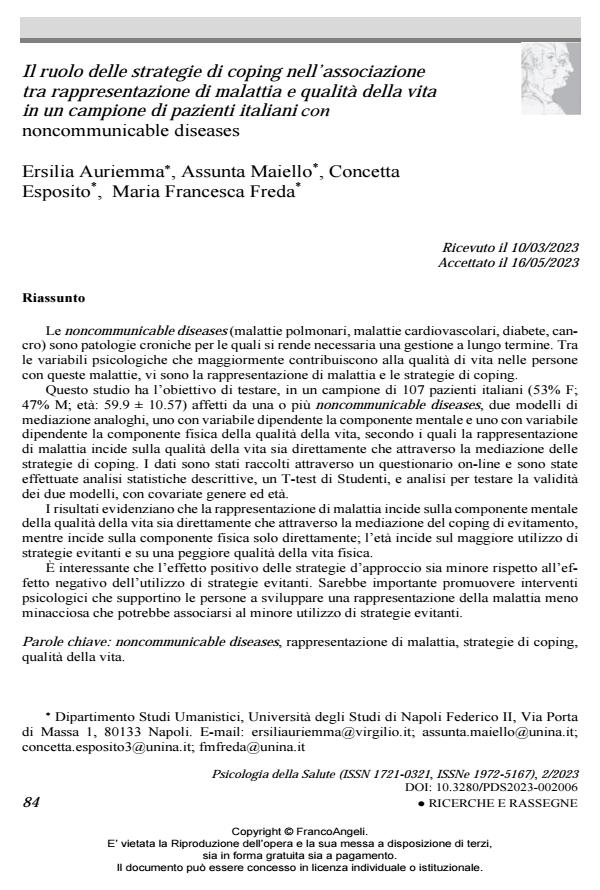The role of coping strategies in the association between illness perception and quality of life in an Italian sample of patients with noncommunicable diseases
Journal title PSICOLOGIA DELLA SALUTE
Author/s Ersilia Auriemma, Assunta Maiello, Concetta Esposito, Maria Francesca Freda
Publishing Year 2023 Issue 2023/2
Language Italian Pages 19 P. 84-102 File size 295 KB
DOI 10.3280/PDS2023-002006
DOI is like a bar code for intellectual property: to have more infomation
click here
Below, you can see the article first page
If you want to buy this article in PDF format, you can do it, following the instructions to buy download credits

FrancoAngeli is member of Publishers International Linking Association, Inc (PILA), a not-for-profit association which run the CrossRef service enabling links to and from online scholarly content.
Noncommunicable diseases (lung disease, cardiovascular disease, diabetes, cancer) are chronic diseases that require long-term management. Among the psychological variables that mostly contribute to the quality of life in people with these diseases, there are illness percep-tion and coping strategies. This study aims to test, in a sample of 107 Italian patients (53% F; 47% M; age: 59.9 ± 10.57) affected by one or more noncommunicable diseases, two analogous mediation models, one with mental component of quality of life and one with the physical component of quality of life as mediation variables, according to which illness perception affects quality of life both directly and through the mediation of coping strategies. Data were collected through an on-line questionnaire and descriptive statistical analyses, a Student T-test, and mediation analysis with gender and age as covariates were performed. The results show that illness perception affects mental component of quality of life both directly and through the mediation of avoidance coping, while it affects the physical compo-nent only directly; age affects greater use of avoidant strategies and a worse physical quality of life. Interestingly, the positive effect of approach strategies is smaller than the negative effect of avoidant strategies. It would be important to promote psychological interventions that support patients to develop a less threatening illness perception that could be associated with less use of avoidant strategies.
Keywords: noncommunicable disease, illness perception, coping strategies, "quality of life".
- Understanding self-care behaviors in older adults with chronic diseases: The influence of personal views on aging and illness perceptions Fabrizio Mezza, Daniela Lemmo, Antonio Bianco, Alessandra Cuomo, Maria Francesca Freda, in Geriatric Nursing 103694/2025 pp.103694
DOI: 10.1016/j.gerinurse.2025.103694
Ersilia Auriemma, Assunta Maiello, Concetta Esposito, Maria Francesca Freda, Il ruolo delle strategie di coping nell’associazione tra rappresentazione di malattia e qualità della vita in un campione di pazienti italiani con noncommunicable diseases in "PSICOLOGIA DELLA SALUTE" 2/2023, pp 84-102, DOI: 10.3280/PDS2023-002006